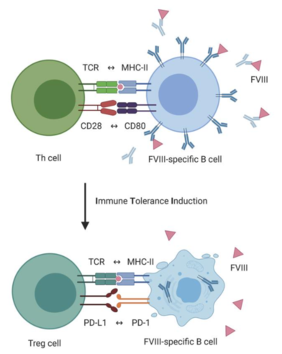
A study led by Janine Becker-Gotot and Christian Kurts from the IMMEI and Johannes Oldenburg from the Institute for Experimental Hematology and Transfusion Medicine (IHT) in Bonn identified the underlying mechanism of tolerance induction against intravenously administered coagulation factor VIII (FVIII).
Most patients with hemophilia A receive recombinant FVIII as a therapy. However, the main therapeutic complication is the formation of inhibitory anti-FVIII antibodies. These antibodies neutralize the infused FVIII protein, leading to increased hemophilia A morbidity and mortality.
Immune tolerance induction therapy (ITI) by repetitive FVIII injection can eradicate these inhibitory anti-FVIII antibodies. However, the underlying immunological mechanisms of tolerance induction against infused FVIII are unknown.
In their current study the team led by Janine Becker-Gotot showed that immune tolerance against FVIII was maintained by PD-L1-expressing regulatory T cells that ligated PD-1 on FVIII-specific B cells, causing them to undergo apoptosis. These findings may have important implications for the monitoring of ITI success and the treatment of hemophilia A patients.
Publication:
Immune Tolerance against Infused FVIII in Hemophilia A Is Mediated by PD-L1+ Regulatory T Cells.
Becker-Gotot J, Meissner M, Kotov V, Jurado-Mestre B, Maione A, Pannek A, Albert T, Flores C, Schildberg FA, Gleeson PA, Reipert BM, Oldenburg J, Kurts C. J. Clin. Invest.2022